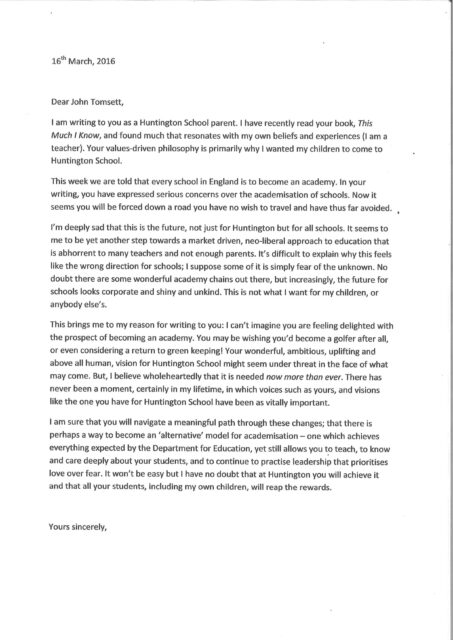A York headteacher is promising parents his school will not become a “corporate” operation if forced to become an academy under new government plans.
John Tomsett (pictured), of Huntington School, made the pledge in response to a letter from a parent received after George Osborne’s Budget announcement last week that every state primary and secondary school will be expected to be an academy by 2022.
The parent wrote: “I’m deeply sad that this is the future, not just for Huntington but for all schools. It seems to me to be yet another step towards a market driven, neo-liberal approach to education that is abhorrent to many teachers and not enough parents.
“No doubt there are some wonderful academy chains out there, but increasingly, the future for schools looks corporate and shiny and unkind. This is not what I want for my children, or anybody else’s.”
The parent implored Mr Tomsett to continue delivering his school’s values of respect, honesty and kindness.
Mr Tomsett, a member of the Headteachers’ Roundtable – a key influencer of government policy – told Schools Week the letter was a “complete surprise”, but it gave him a “genuine boost” that parents want a “values-driven future”.
He said if academisation was made mandatory, he would make it an opportunity to forge a future based upon the school’s “core purpose and our values-system”.
“Any Huntington academy will focus upon improving the quality of teaching and learning above all else, to the benefit of our children, just as our parent wishes,” he said.
“If you begin and live by those values then whatever decision you make about academisation, because clearly it is inevitable, then you have a chance of doing something good.”
Mr Tomsett’s vision of an academy is similar to a co-operative schools model which gives staff, parents and the community a “guaranteed say” in their school and how it develops.
Julie Thorpe, school programmes and digital learning lead at Co-operative College, a charity that promotes the co-operative model, told Schools Week there is a “real democratic deficit” in the standard academy model – “and this will grow even deeper with the announcement of the removal of the requirement to have parent governors”.
Dave Parr, director of Oasis Community Partnerships at Oasis Community Learning, a multi-academy partnership that also encourages public input into how its schools are run, said there are ways for parent and community voices to still be heard when they become academies.
Oasis has created local academy councils – boards made up of people from the local community, whose purpose is to be a “parental voice”.
“Our councils empower the community to be part of the life at our schools,” Mr Parr said.
This approach contrasts with the E-ACT academy group that recently replaced school governors with “ambassadorial advisory bodies”, ending the involvement of parent representatives in holding their local school to account.
An E-ACT spokesperson told Schools Week the changes would benefit pupils and were “in line with the Department for Education’s guidance”.
Mr Tomsett said his school did not need a specific “brand”, such as the co-operative model, instead it would build its own vision.
Click on the image for a larger version








I very much admire John Tomsett’s principles. However I am a little confused.
What is this co-operative model?
The DfE preferred model is for Multi Academy Trusts (MATs). In a MAT the individual school disappears totally so talk of this or that ethos for a school is almost irrelevant. In a MAT you sign up to the values of the MAT and these is no way out because your school ceases to exist.
Talk of “chains” and “partnerships” muddy the waters. They imply that the schools within a MAT are individual organisations when in reality they are just branch offices.
I hope I am wrong and John Tomsett can create a new model which allows school individuality and local accountability. Can anyone point to where such a model is working successfully, and complies with the principles within the EEE whitepaper?